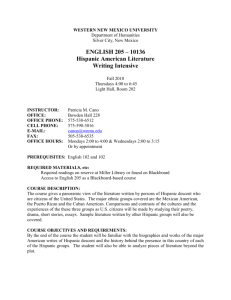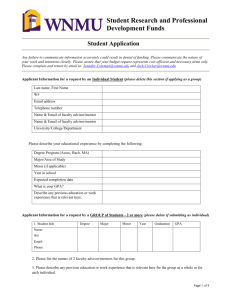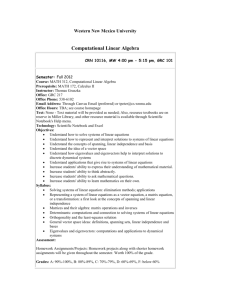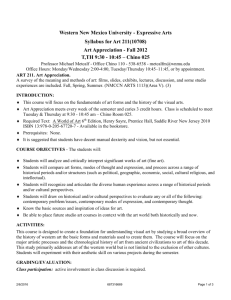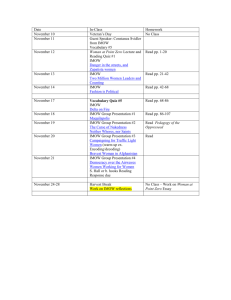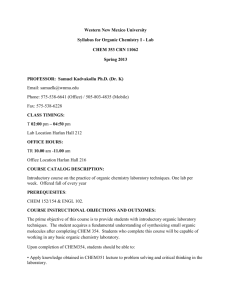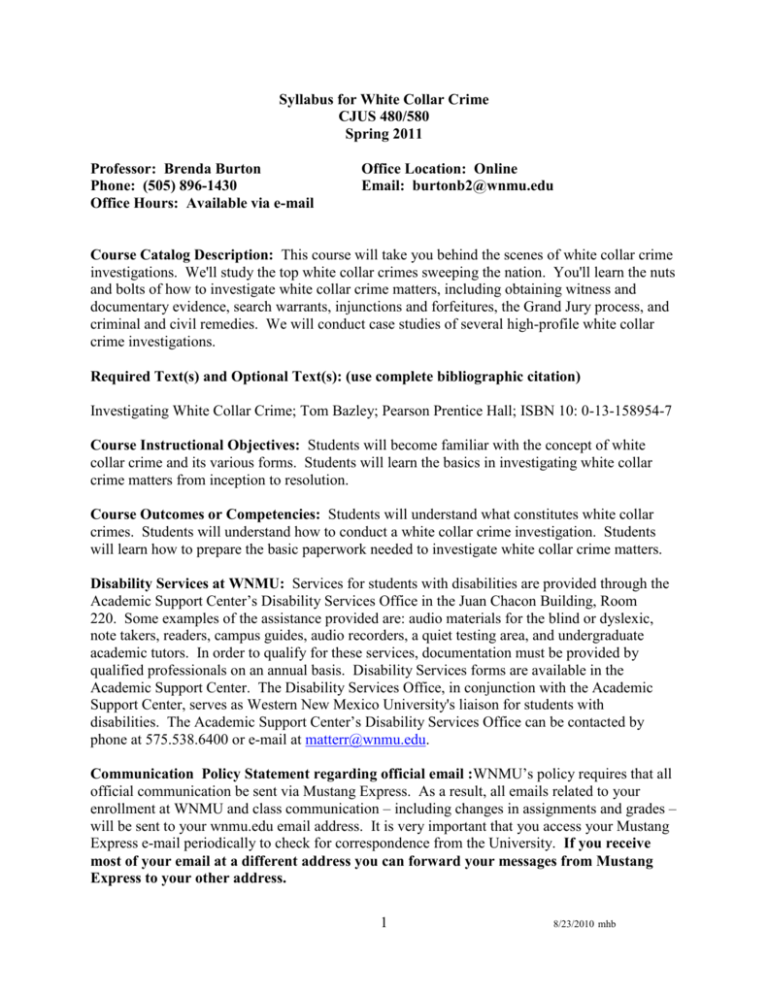
Syllabus for White Collar Crime
CJUS 480/580
Spring 2011
Professor: Brenda Burton
Phone: (505) 896-1430
Office Hours: Available via e-mail
Office Location: Online
Email: burtonb2@wnmu.edu
Course Catalog Description: This course will take you behind the scenes of white collar crime
investigations. We'll study the top white collar crimes sweeping the nation. You'll learn the nuts
and bolts of how to investigate white collar crime matters, including obtaining witness and
documentary evidence, search warrants, injunctions and forfeitures, the Grand Jury process, and
criminal and civil remedies. We will conduct case studies of several high-profile white collar
crime investigations.
Required Text(s) and Optional Text(s): (use complete bibliographic citation)
Investigating White Collar Crime; Tom Bazley; Pearson Prentice Hall; ISBN 10: 0-13-158954-7
Course Instructional Objectives: Students will become familiar with the concept of white
collar crime and its various forms. Students will learn the basics in investigating white collar
crime matters from inception to resolution.
Course Outcomes or Competencies: Students will understand what constitutes white collar
crimes. Students will understand how to conduct a white collar crime investigation. Students
will learn how to prepare the basic paperwork needed to investigate white collar crime matters.
Disability Services at WNMU: Services for students with disabilities are provided through the
Academic Support Center’s Disability Services Office in the Juan Chacon Building, Room
220. Some examples of the assistance provided are: audio materials for the blind or dyslexic,
note takers, readers, campus guides, audio recorders, a quiet testing area, and undergraduate
academic tutors. In order to qualify for these services, documentation must be provided by
qualified professionals on an annual basis. Disability Services forms are available in the
Academic Support Center. The Disability Services Office, in conjunction with the Academic
Support Center, serves as Western New Mexico University's liaison for students with
disabilities. The Academic Support Center’s Disability Services Office can be contacted by
phone at 575.538.6400 or e-mail at matterr@wnmu.edu.
Communication Policy Statement regarding official email :WNMU’s policy requires that all
official communication be sent via Mustang Express. As a result, all emails related to your
enrollment at WNMU and class communication – including changes in assignments and grades –
will be sent to your wnmu.edu email address. It is very important that you access your Mustang
Express e-mail periodically to check for correspondence from the University. If you receive
most of your email at a different address you can forward your messages from Mustang
Express to your other address.
1
8/23/2010 mhb
Example: Martin Classmember was assigned a WNMU email address of
classmemberm12@wnmu.edu but Martin would rather receive his emails at his home email
address of martinclass@yahoo.com
Martin would follow the direction provided at
http://www.wnmu.edu/campusdocs/direction%20for%20forwarding%20email.htm
WNMU Policy on Email Passwords: WNMU requires that passwords for access to all of the
protected software, programs, and applications will be robust, including complexity in the
number of characters required, the combination of characters required, and the frequency in
which passwords are required to be changed. Minimum complexity shall include:
Passwords shall contain at least six (6) characters.
Passwords shall contain at least one capital (upper case) letter, and at least one symbol
(numbers and characters such as @ # $ % & *).
Passwords shall be changed at least every 90 days. (8/6/08)
Academic Integrity Policy and Procedures: Each student shall observe standards of honesty
and integrity in academic work as defined in the WNMU catalog. Violations of academic
integrity include “any behavior that misrepresents or falsifies a student’s knowledge, skills or
ability with the goal of unjustified or illegitimate evaluation or gain” (WNMU Faculty
Handbook, 2008). Generally violations of the academic integrity include cheating and
plagiarism. Refer to the catalog pages 60-61 for definitions.
Penalties for infractions of academic integrity in this class are as follows:
Plagiarism: “the intentional or unintentional representation of another’s work as one’s own
without proper acknowledgement of the original author or creator of the work” (WNMU Faculty
Handbook, 2008).
Students will receive a grade of zero points for the assignment.
Cheating: “using or attempting to use unauthorized materials…and unauthorized collaboration
with others, copying the work of another or any action that presents the work of others to
misrepresent the student’s knowledge” (WNMU Faculty Handbook, 2008).
Students will receive a grade of zero points for the assignment.
Class Procedures for Inclement Weather: N/A
Assessment/Evaluation and Grading Scale:
A - 90-100% (621-690 points)
B - 80-89% (552-620 points)
C - 70-79% (483-551 points)
D - 60-69% (414-482 points)
F - 59% and less (less than 414 points)
2
8/23/2010 mhb
Assignments/Due Dates:
Week 1 (Jan. 10-16)
Chapter 1 - Introduction: Why Bother?
Introductory discussion board (10 points)
Quiz (20 points)
Week 2 (Jan. 17-23)
Chapter 2 - Getting Started
Quiz (20 points)
Public Discussion Question (10 points)
Essay (10 points)
Week 3 (Jan. 24-30)
Appendix A - Common White Collar Crimes (pages 231-242)
Quiz (20 points)
Public Discussion Question (10 points)
Essay (10 points)
Week 4 (Jan. 31 - Feb. 6)
Outside reading assignment -- Internet Fraud and Scams/2008 Internet Crime Report/Internet
Fraud, Scam and Crime Stats -- 2009
Quiz (20 points)
Public Discussion Question (10 points)
Essay (10 points)
Week 5 (Feb. 7-13)
Chapter 3 - The Paper Chase: Documentary Evidence
Quiz (20 points)
Public Discussion Question (10 points)
Essay (10 points)
Week 6 (Feb. 14-20)
Chapter 4 - Interviews: Gathering Testimonial Evidence
Quiz (20 points)
Public Discussion Question (10 points)
Essay (10 points)
Week 7 (Feb. 21-27)
Chapter 5 - Search Warrants
Quiz (20 points)
Public Discussion Question (10 points)
Essay (10 points)
3
8/23/2010 mhb
Week 8 (Feb. 28 - March 6)
Case Study - Ponzi Schemes
Written Assignment (40 points)
Spring Break (March 7-13)
Week 9 (March 14-20)
Chapter 6 - Injunctions and Forfeitures: Halting the Crime and Taking Away the Profits
Quiz (20 points)
Public Discussion Question (10)
Essay (10 points)
Week 10 (March 21-27)
Chapter 7 - Evidence Analysis: Using the Experts
Quiz (20 points)
Public Discussion Question (10 points)
Essay (10 points)
Week 11 (March 28-April 3)
Chapter 8 - The Grand Jury and Criminal Charges
Quiz (20 points)
Public Discussion Question (10 points)
Essay (10 points)
Week 12 (April 4 - 10)
Case Study
Written Assignment (40 points)
Week 13 (April 11-17)
Chapter 9 - Civil and Administrative Investigations
Quiz (20 points)
Public Discussion Question (10 points)
Essay (10 points)
Week 14 (April 18-24)
Chapter 10 - Reaching a Disposition
Quiz (20 points)
Public Discussion Question (10 points)
Essay (10 points)
Week 15 (April 25 - May 1)
Outside reading assignment -- The Cost of White Collar Crime (TBA)
Quiz (20 points)
Public Discussion Question (10 points)
Essay (10 points)
4
8/23/2010 mhb
Week 16 (May 2-8)
Course Review
Final Exam (May 9-12)
To Be Announced
Other Expectations: This is a writing intensive course. I expect well-thought out answers to
the various questions posed. You may quote sparingly from the text or other sources if it adds to
your answer. Assignments must be turned in on time unless there are extenuating circumstances.
You must let me know if your work will be late for any reason.
5
8/23/2010 mhb

